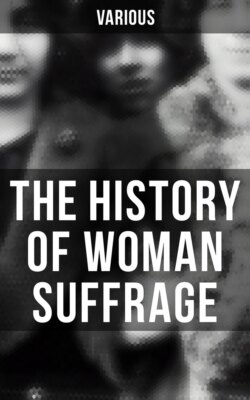Читать книгу The History of Woman Suffrage - Various - Страница 77
На сайте Литреса книга снята с продажи.
MOB CONVENTION IN NEW YORK.
ОглавлениеBroadway Tabernacle, Sept. 6 and 7, 1853.
This week as already stated was one of unusual excitement in the city of New York, as representatives of all the unpopular reforms were holding their several conventions. The fact that the Anti-Slavery Society held a meeting on Sunday morning, and Antoinette Brown preached to five thousand people the same evening, called out the denunciations of the religious press, which intensified the mob spirit, culminating at last in the Woman's Rights Convention. That portion of the secular press which had shown the most bitter opposition to the anti-slavery cause, now manifested the same spirit toward the enfranchisement of woman.
The leading papers in the United States were The Tribune, The Herald, The Times, The Evening Post, and The Express, which gave tone to the entire press of the country. All these journals were edited by men of marked ability, each representing a different class of thought in the community. The Tribune was independent, and fearless in the expression of opinions on unpopular reforms; its editor, Horace Greeley, ever ready for the consideration of new ideas, was on many points the leader of liberal thought.
The Herald was recognized by reformers as at the head of the opposition, and its diatribes were considered "Satanic." Its editor, James Gordon Bennett, pandered to the lowest tastes in the community, not merely deriding reforms, but holding their advocates up to the ridicule of a class too degraded to understand the meaning of reform.
The Times held a middle position; established at a much later date, its influence was not so great nor extended as either The Tribune or The Herald. It represented that large conservative class that fears all change, and accepts the conditions of its own day and generation, knowing that in all upheavals the wealthy class is the first and greatest loser. From this source the mob spirit draws its inspiration. Violence being the outgrowth of superstition and despotism; the false morality and philosophy taught by the press and the pulpit are illustrated by the lower orders in hisses, groans, and brick-bats. Although far below Horace Greeley in sagacity, intelligence, and conscience, Henry J. Raymond claimed for his paper a position superior in respectability. Having originated the present system of reporting, and thereby acquired his first reputation, Mr. Raymond prided himself upon reportorial sharpness, even at the expense of veracity and common self-respect. That woman so long degraded should dare to speak of injustice, so long defrauded of her social, civil, and political rights, should dare to demand some restitution, was to Mr. Raymond so fit a subject for ridicule that he could not refrain from making even such women as Lucretia Mott and Ernestine L. Rose targets for his irony.
The Empress, an organ of the Democratic party, was in its debasement on a par with The Herald and Times, though each had different styles, more or less refined, of doing the same thing. Encouraged by these three papers, the mob element held high carnival through that eventful week. Starting in the anti-slavery and temperance meetings, they assembled at every session in the Woman's Rights Convention. Gentlemen and ladies alike who attempted to speak were interrupted by shouts, hisses, stamping, and cheers, rude remarks, and all manner of noisy demonstrations. The clergy, the press, and the rowdies combined to make those September days a disgrace to the metropolis, days never to be forgotten by those who endured the ridicule and persecution.
Although the Mayor with a large police force at his command made no show even of protecting the right of free speech, the editor of The Tribune sent forth his grand fulminations against bigotry, hypocrisy, and vulgarity in every issue of his journal. William Cullen Bryant, editor of The Post, one of the purest men that ever stood at the head of a daily paper, also spoke out grandly against mob law, and for the rights of woman. We have made this brief episode on the press, that our readers may see how characteristic are the comments of each paper that we give here and there in this chapter.
This Convention, interrupted throughout by the mob, has an unique and historic value of its own. It was the first overt exhibition of that public sentiment woman was then combating. The mob represented more than itself; it evidenced that general masculine opinion of woman, which condensed into law, forges the chains which enslave her. Owing to the turmoil we have no fair report of the proceedings; it was impossible for the representatives of the press to catch what was said, hence their reports, as well as the one issued by our Central Committee, are alike fragmentary. And yet with such a brilliant array of speakers of both men and women, it should have been one of our most interesting and successful Conventions. The Tabernacle, holding three thousand persons, was packed long before the hour announced. At ten o'clock Lucy Stone called the Convention to order, and presented a list of officers117 nominated at a preliminary meeting, which was adopted. In this list we find England, Germany, and eleven States represented. The Rev. William Henry Channing opened the meeting with prayer. After which Mrs. Mott made a few appropriate remarks. Lucy Stone read a series of resolutions118 which were accepted and laid on the table for discussion.
Charles Burleigh and Lydia A. Jenkins spoke briefly on the many grounds of opposition to this movement, which in all respects commends itself as one of the greatest reforms of the age.
